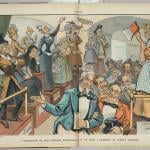A few quick takes from Daniel Siedell’s excellent God in the Gallery: A Christian Embrace of Modern Art (Cultural Exegesis) : After pointing out that Eastern Christians prefer the flatness of icons to the realistic perspective of Western art, Siedell concludes that this should “remind us that flatness [in Eastern Christian or modern art] is not by itself nihilistic, atheistic, or otherwise anti-Christian . . . . Modernist art is often dismissed by Christian commentators because it looks like it... Read more
















